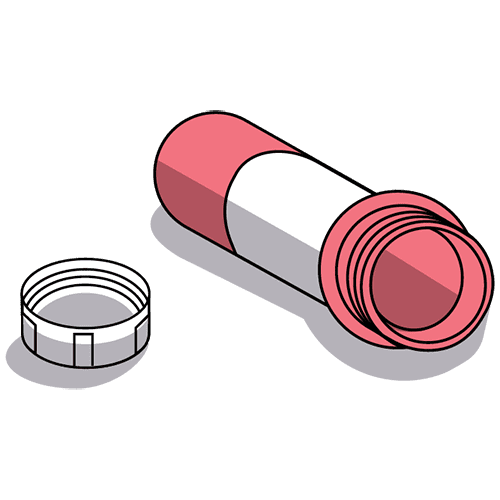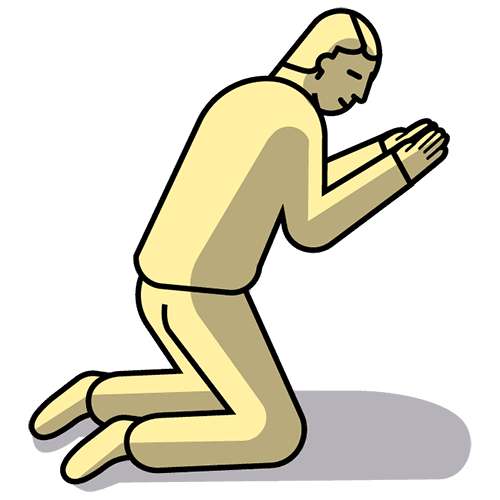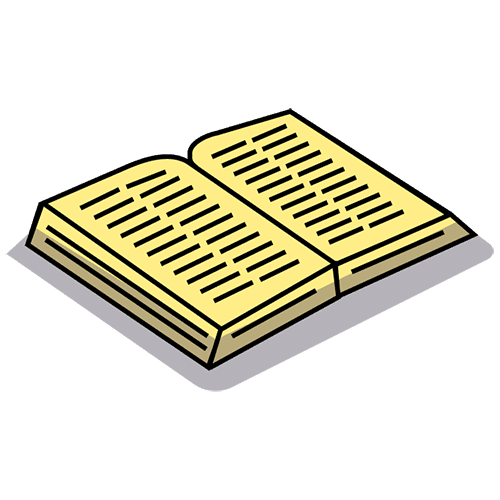Can You Feel God’s Love?

It’s always there. If you can’t fully sense it, your spiritual receptors may need healing.
By Dale G. Renlund in the Summer 2020 Issue
Illustrations by Adam M. Johnson (BA ’07)
Your physical health depends on hormones and their receptors. Hormones, such as thyroid hormones, insulin, and many others, are substances produced in glands and then transported in the bloodstream to specific cells, and they stimulate those cells by interacting with specific receptors. Illness can occur when either the gland does not produce enough hormone or the receptor is dysfunctional. You can imagine that the signs and symptoms of an illness can be similar in either case. Hormone and other treatments can resolve or mitigate the illness in many situations.

There is a type of receptor dysfunction that is eternally consequential: the inability to sense God’s love and feel His Spirit. God’s love is infinite and perfect. There has never been nor will there ever be a deficiency of God’s love. The apostle Paul said:
Who shall separate us from the love of Christ? shall tribulation, or distress, or persecution, or famine, or nakedness, or peril, or sword? . . .
For I am persuaded, that neither death, nor life, nor angels, nor principalities, nor powers, nor things present, nor things to come,
Nor height, nor depth, nor any other creature, shall be able to separate us from the love of God, which is in Christ Jesus. [Rom. 8:35, 38–39]

But what do you do if you do not feel the love of Heavenly Father and Jesus Christ? I know with certainty that the problem is not with Their love. The problem is with your receptors for Their love. If you have dysfunction of your receptors for God’s love, you can lose your way and succumb to dangers such as hopelessness, helplessness, and loneliness.
If you experience dysfunction of these receptors, God’s influence in your life is minimized. With complete dysfunction, you will not sense Their love or Their caring concern for you. The prophet Mormon described this condition in his people. He lamented:
For behold, . . . they are without Christ and God in the world. . . .
They were once a delightsome people, and they had Christ for their shepherd; yea, they were led even by God the Father.
But now, behold, they are led about by Satan, even as chaff is driven before the wind, or as a vessel is tossed about upon the waves, without sail or anchor, or without anything wherewith to steer her; and even as she is, so are they. [Morm. 5:16–18]
“Without Them, there is . . . no power, no stability, and no direction.”
Without Heavenly Father and Jesus Christ and Their influence in our lives, we have no shepherd. Without Them, there is no sail—meaning there is no power. Without Them, there is no anchor—meaning there is no stability, especially in times of storm. Without Them, there is nothing with which to steer—meaning there is no direction. No power, no stability, and no direction are all consequences of dysfunctional receptors for Their love.
A Cautionary Tale
In my experience, receptor dysfunction for God’s love happens slowly and imperceptibly over time—not all at once. I will relate an embarrassing experience that I did not tell my wife for years. I learned for myself that I was vulnerable. Because I suspect you might be at risk too, I will share my cautionary tale. It highlights this warning by the Savior:
But there is a possibility that man may fall from grace and depart from the living God;

Therefore let the church take heed and pray always, lest they fall into temptation;
Yea, and even let those who are sanctified take heed also. [D&C 20:32–34]
After I finished medical school, my wife, daughter, and I moved to Baltimore for further training at Johns Hopkins Hospital. At that time the training years were brutal, time intensive, and exhausting.
Toward the end of my first year, I was weary. Because interns worked every day and every second or third night, I worked every Sunday and was able to attend church only about half the time. Our ward met in a suburb of Baltimore at 2:30 in the afternoon. We lived across the street from the hospital and had only one car. Some Sundays I could finish my work and join my wife and daughter as they left for the meetings at 2:00 p.m. Other Sundays I could not.
One Sunday I could tell that if I really hurried with my work, I would be able to go with my wife and daughter to church. But then I had this thought: If I slowed down a little bit and waited, I would not get home until after my wife and daughter had departed. Then I could skip church and take a nap. It mortifies me to say that I did exactly that.
“I shudder to think what would have happened if I had not gotten off that couch that Sunday afternoon.”
I walked home at 2:15 and lay down on the couch. But I could not sleep. I was profoundly disturbed. I had always loved going to church. I had always felt a burning testimony of Christ’s living reality. But on that day the intensity was not there.
It was not so hard to figure out why. I had stopped consistently doing some personal, private acts of devotion. My routine was that I would get up in the morning, say a prayer, and go to work. Sometimes there would be no distinction between the end of the day and the beginning of the next. I would work through the night and the next day, come home late that second day, and fall asleep without a prayer and without reading anything in the scriptures. The following day the cycle started again. I had allowed my receptors for God’s love to become dull, so that the things of the Spirit were less urgent and less important.

With this realization, I got off the couch, knelt on the floor, and pleaded with God for forgiveness. I begged for help. As I did, a plan formulated in my mind and heart to change the pattern of behavior.
I began with simple reminders to myself. On my daily to-do list, I started including morning and evening prayers. I brought a paperback Book of Mormon to my cubicle in the hospital and included scripture reading on that to-do list. Some nights the scripture reading was short, just a few verses before midnight. Sometimes my prayers were offered in unusual locations. But I read the scriptures daily. I prayed daily. My plan included a commitment that I would never miss an opportunity to partake of the sacrament. Never.
As I enacted my new course of action, the intensity returned and my testimony burned brightly again. I shudder to think what would have happened if I had not gotten off that couch that Sunday afternoon. My life would have been very different. Instead, Heavenly Father and Jesus Christ became central to my life again. My receptors for God’s love and my affinity for the Spirit improved.
A Prescription

The inability to sense God’s love can stem from sin or from not pressing forward on the covenant path. The inability can also be due to physical or mental illness. For instance, clinical anxiety and depression require professional help. God expects us to seek professional help when indicated. Remember Captain Moroni’s rhetorically sarcastic question to Pahoran: “Do ye suppose that the Lord will still deliver us, while we . . . do not make use of the means which the Lord has provided for us?” (Alma 60:21). Prayers in this situation may seem somewhat insincere to God as they are manifestations of faith without works.
In my situation, absent mental illness, I followed a threefold prescription for my dysfunctional receptors for God’s love:
Repentance
The first is what President Russell M. Nelson refers to as “increased purity, exact obedience.”¹ This means repentance. If you are doing something that is causing receptor dysfunction, repent. Repentance is a joyful process. Remember that God does not really care who you were and what you did. He cares who you are, what you are doing, and who you are becoming. As President Nelson said, repentance is not punishment:

[The] feeling of being penalized is engendered by Satan. He tries to block us from looking to Jesus Christ, who stands with open arms, hoping and willing to heal, forgive, cleanse, strengthen, purify, and sanctify us.²
If you feel that you have done something unredeemable or irreparable or you are too far gone, that feeling is not coming from the Holy Ghost. It is engendered by faulty thinking or by Satan.
Scripture Study
The second is what President Nelson refers to as “earnest seeking, daily feasting on the words of Christ in the Book of Mormon.”³ Feasting, not nibbling, on the words of Christ, especially in the Book of Mormon, has the power to dramatically change receptors for God’s love. Studying the words of Christ will put you “in a position to begin having experiences with [God].”⁴ It did for me. This advice from Paul to Timothy applies to you:

From a child thou hast known the holy scriptures, which are able to make thee wise unto salvation through faith which is in Christ Jesus.
All scripture is given by inspiration of God, and is profitable for doctrine, for reproof, for correction, for instruction in righteousness. [2 Tim. 3:15–16]
Partaking of the Sacrament
Third, I made sure that I would never miss an opportunity to partake of the sacrament so that I could have the Holy Ghost with me. The Savior said to the Nephites regarding partaking of the sacrament: “If ye shall always do these things blessed are ye, for ye are built upon my rock” (3 Ne. 18:12). If you do not, He said, then you “are not built upon my rock, but are built upon a sandy foundation; and when the rain descends, and the floods come, and the winds blow, and beat upon [you], [you] shall fall” (3 Ne. 18:13). Remember that He said when rain, floods, and wind come, not if. They come, and they come to all of us. But if we have partaken of the sacrament conscientiously and worthily, then the blessings come so that we won’t fall.

An added insight about the sacrament comes from President Nelson’s remarks at the mission leadership seminar in June 2019. After partaking of the sacrament, President Nelson said:
I made a covenant as I partook of the sacrament that I would be willing to take upon me the name of Jesus Christ and . . . to obey His commandments. Often, I hear the expression that we partake of the sacrament to renew covenants made at baptism. While that’s true, it’s much more than that. I’ve made a new covenant. You have made new covenants.⁵
If we approach the sacrament with a broken heart and contrite spirit, the way we expect a new convert to approach baptism, God renews the blessings of baptism for us, including the cleansing effect.⁶
In the mission leadership seminar, after talking about making new covenants through the partaking of the sacrament, President Nelson continued: “Now in return for which [God] makes the statement that we will always have His Spirit to be with us. What a blessing!”⁷
This is the three-part prescription for dysfunctional receptors for God’s love: repentance, scripture study, and partaking of the sacrament to have the Holy Ghost with us. If we do not address this dysfunction early on, we will end up “past feeling” (1 Ne. 17:45). And that is spiritually fatal.
Addressing our dysfunctional receptors for God’s love restores power, stability, and direction in our lives. The prognosis when this receptor dysfunction is treated is excellent.
“I encourage you to get off the couch, like I did that Sunday afternoon. . . . Continue doing those personal, private acts of devotion. “
I encourage you to get off the couch, like I did that Sunday afternoon long ago. Make sure your receptors for God’s love are fully functional. Then, as you continue doing those personal, private acts of devotion, you won’t slip back into receptor dysfunction. I know that Jesus Christ “has all power to save every[one] that believeth on his name and bringeth forth fruit meet for repentance” (Alma 12:15). I know that our Heavenly Father’s message to us is this:
If ye will repent, and harden not your hearts, then will I have mercy upon you, through mine Only Begotten Son;
Therefore, whosoever repenteth, and hardeneth not his heart, he shall have claim on mercy through mine Only Begotten Son, unto a remission of his sins; and these shall enter into my rest. [Alma 12:33–34]
This is my prayer for all of us. I pray that God will watch over and bless you and help you throughout your lives.

Elder Dale G. Renlund, a member of the Quorum of the Twelve Apostles of The Church of Jesus Christ of Latter-day Saints, delivered this devotional address on Dec. 3, 2019. Find this and more than 2,000 other talks in video, audio, and print formats at speeches.byu.edu.
Feedback: Send comments on this story to magazine@byu.edu.
NOTES
- Russell M. Nelson, “Revelation for the Church, Revelation for Our Lives,” Ensign, May 2018.
- Russell M. Nelson, “We Can Do Better and Be Better,” Ensign, May 2019.
- Nelson, “Revelation for the Church.”
- Russell M. Nelson, “Come, Follow Me,” Ensign, May 2019.
- Russell M. Nelson, mission leadership seminar, June 2019; quoted in Dale G. Renlund, “Unwavering Commitment to Jesus Christ,” Ensign, November 2019.
- “Church members are commanded to gather together often to partake of the sacrament to remember the Savior always and to renew the covenants and blessings of baptism” (Handbook 2: Administering the Church [Salt Lake City: The Church of Jesus Christ of Latter-day Saints, 2010], 2.1.2 [ p. 9]; emphasis added).
- Nelson, mission leadership seminar; quoted in Renlund, “Unwavering.”




